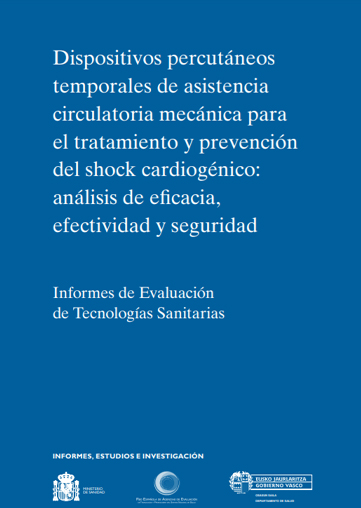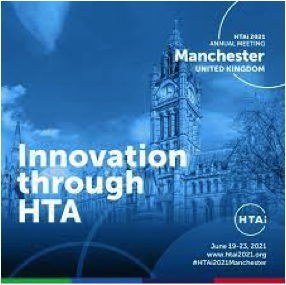News
We are pleased to announce the publication of the article "Synthesis of relevant information around non-core domains to support Multi-Criteria Decision Analysis (MCDA) for decision making " in the prestigious scientific journal GMS (German Medical Science) – Health Innovation and Technologies. This work has been developed by members of Osteba/Bioef: Juan Carlos Bayón, Asún Gutiérrez, Lorea Galnares and Iñaki Gutierrez-Ibarluzea. The article is based on a Delphi study and offers valuable insights into the application of Multicriteria Decision Analysis (MCDA) in non-core domains.
https://www.egms.de/static/en/journals/hta/2024-18/hta000139.shtml
The article "Experiences of Water Immersion During Childbirth: A Qualitative Thematic Synthesis" has been published in BMC Pregnancy and Childbirth. This study is the result and forms part of the report of the Spanish Network of Agencies for Assessing National Health System Technologies and Performance (RedETS) on water immersion during labor.
The article includes experts in Health Technology Assessment from the RedETS Patient Interest Group (GIP). Their participation has contributed to improve the methodology of incorporating women voice in the study.
The main objective of the study is to identify and synthesize evidence on the experiences, values and preferences of women and midwives regarding immersion in water during delivery.
Through qualitative studies review, three fundamental aspects have been identified: the first focuses on the reasons that lead women to choose water delivery; the second analyzes the perceived benefits of immersion in water; and the third examines the barriers and facilitators associated with this practice.
These findings provide information on the experiences, preferences and perspectives of women and midwives regarding immersion in water during delivery. Reported results can help inform and guide maternal health care and services, as well as support women's informed decision making.
Applications submission deadline 21 March 2022
SAFE-N-MEDTECH launches an open call to provide services and support to companies to accelerate the development and marketing of innovative MedTech nanotechnology-based solutions. The SAFE-N-MEDTECH consortium, based on the knowledge and experience of its members, offers the following services: characterization, preclinical validation, access to biobanks and patient samples, scale up and regulatory support, early identification and health technology assessment (the full list of services is specified in the Guidelines for Applicants document).
SAFE-N-MEDTECH project- Safety testing in the life cycle of nanotechnology - enabled medical technologies for Health, funded by the European Commission H2020 framework programme, aims to build an open innovation platform (OITB) to support the introduction to the market of new technology-based and value-based medical technologies. SAFE-N-MEDTECH brings together the experience of 28 partners around the world focused on enabling the safe and efficient transfer of nanotechnology-based medical technologies from concept testing to markets and clinical practice.
The call is addressed to small or medium-sized enterprises (including start-ups) based in the EU or associated countries eligible under the H2020 programme. Proposals should be presented in a single phase through the Application Form platform. The deadline to send applications is from 22 February to 21 March 2022.
A briefing will be held on 3 March to present the most relevant information concerning the project and the open call. The access link will be published over the next few days in Linkedin: https://www.linkedin.com/company/safenmt/
Additional information on the call: https://safenmt.com/open-call-innovative-medtech-solutions-based-on-nanotechnology/
Documents of interest:
Report on temporary percutaneous mechanical circulatory support devices for the treatment and prevention of cardiogenic shock
 Cardiogenic shock is a health problem that carries a poor prognosis and treatment with drugs does not significantly reduce the high mortality rate. Timely implantation of a percutaneous mechanical circulatory support device can result in quick stabilisation and haemodynamic improvement.
Cardiogenic shock is a health problem that carries a poor prognosis and treatment with drugs does not significantly reduce the high mortality rate. Timely implantation of a percutaneous mechanical circulatory support device can result in quick stabilisation and haemodynamic improvement.
OSTEBA compared the efficacy, effectiveness and safety of several percutaneous devices such as the intra-aortic balloon pump, Impella® devices and the veno-arterial extracorporeal membrane oxygenation (VA-ECMO) system.
The scientific evidence available for the numerous comparisons that were made is generally of poor quality, indicating that there is some uncertainty, so the findings should be interpreted with caution.
In the case of high-risk coronary interventions, strong evidence has been found showing that fewer significant side effects occur at one month and at 3 months if Impella® 2.5 devices are implanted rather than intra-aortic balloon pumps.
Furthermore, the implantation of intra-aortic balloon pumps decreases mortality compared to conventional medical treatment in patients with cardiogenic shock. The quality of/confidence in the evidence available in this case is high, indicating that the result is reliable and it is unlikely that further studies will alter our confidence in the result.
An article published by Osteba / BIOEF authors receives the 2021 Egon Jonsson award

- The presentation of the prestigious award was made public during the celebration of the HTAi 2021 Annual Meeting on June 19-23, 2021
- The Egon Jonsson award, the most prestigious in the area of health technology assessment, recognizes the most relevant article published in the journal IJTAHC (International Journal of Technology Assessment in Health Care)
Egon Jonsson is a researcher and health services manager with a relevant career, having been editor-in-chief of the aforementioned journal in the period 1992-2010 and director of the Swedish agency (SBU) and founder of the Canadian agency Institute for Health Economics ( IHE) that are HTA reference agencies internationally. Egon Jonsson has been a senior consultant for the World Health Organization and an advisor to health systems in different countries around the world.
The article aims to synthesize the methods used to identify technologies that are candidates for disinvestment due to their low or null value in terms of health or compared to safer, more effective or more efficient alternatives and to propose an evidence-based framework to help those who want to start a disinvestment process and benefit package optimization.
Based on the evidence, a new framework for identifying obsolete technologies is proposed following a broad definition of those technologies. The framework comprises seven basic approaches, eleven triggers, and thirteen methods for applying these triggers, which have been grouped into integrated and ad hoc methods.
The proposed framework is a rigorous and flexible tool that could guide the implementation of strategies to identify possible candidates for disinvestment, maintaining the quality of health systems and increasing their efficiency to allow them to face new investment challenges required by the arrival of disruptive and high cost health technologies. The article has been the fruit of an international collaboration with researchers from the Basque Country, Argentina and the United Kingdom. This collaboration continues with other works to identify obsolete technologies in specific areas such as trauma, hospital emergencies or oncology.
The award is presented within the framework of the HTAi Annual Meeting held in 2021 in Manchester, virtually, the most relevant event in the field of Health Technology Assessment that has had as its main theme in this edition: The leadership of innovation in health. This is an opportunity that offers for both researchers, decision makers (managers and politicians), health professionals, members of technology companies, as well as patients, reflecting on how they could innovate locally and in continental regions, through the central elements of the analysis of the evidence, for decision-making, being that the central axis of the work of Health Technology Assessment.
Reference of the awarded article:
Esandi, M., Gutiérrez-Ibarluzea, I., Ibargoyen-Roteta, N., & Godman, B. (2020).
An evidence-based framework for identifying technologies of no or low-added value (NLVT). International Journal of Technology Assessment in Health Care, 36(1), 50-57. doi: 10.1017/S0266462319000734
Last modified date:
